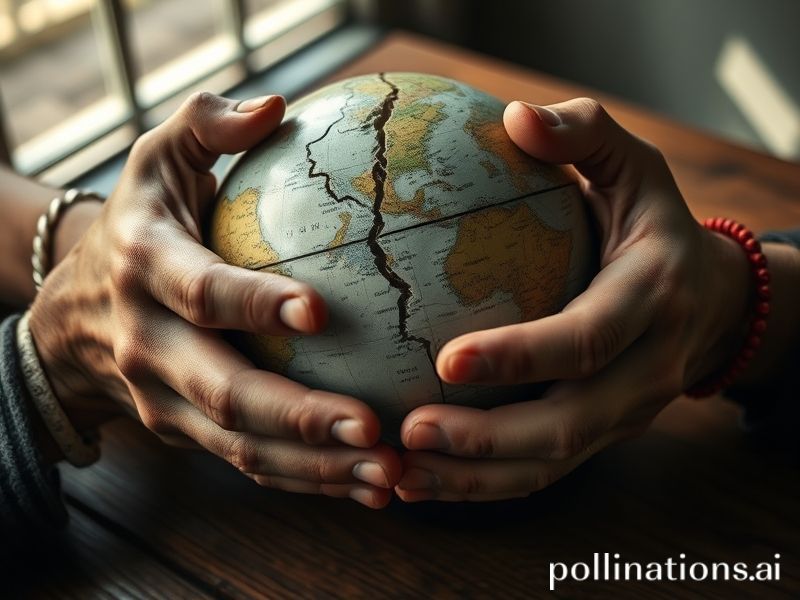Elephant Sumo in the Pacific: How the US-China Rivalry Is Reshaping the World Between Eye-Twitches
The world’s longest, most expensive staring contest is back on. Washington and Beijing have once again squared off across the Pacific, pupils dilated, wallets open, each daring the other to blink first while the rest of us try to remember when this stopped being metaphorical and started costing real money. From semiconductor embargoes that read like grocery lists for Bond villains, to spy-balloon melodramas worthy of a Netflix mini-series, the U.S.–China rivalry has become the planet’s background hum—white noise with the occasional air-raid siren.
Europe, ever the conscientious dinner guest, is politely pretending it isn’t sitting between two quarrelling hosts. Brussels talks “strategic autonomy,” a phrase that roughly translates to “please don’t make us choose between iPhones and cheap electric cars.” Meanwhile, German factories calculate how many Volkswagens equal one Huawei router, and French diplomats practice saying “rules-based order” in Mandarin without giggling. The Old World’s hedging strategy looks less like diplomacy and more like someone trying to pay the restaurant bill with a handful of euros, yuan, and whatever dignity is left in the couch cushions.
Down in the Global South, governments watch the superpower tango with the weary amusement of bartenders who’ve seen this couple before. Brazil sells soybeans to Beijing and beef to Washington, proving that you can indeed serve two masters if you marinate the product correctly. Kenya’s new Chinese-built railway runs on American-financed software, a metaphor so perfect it could win a creative-writing prize. Across Africa, leaders weigh 5G contracts against IMF loans, calculating which partner will repossess fewer ports when the music stops. The consensus: when elephants fight, the grass gets trampled; when elephants flirt, the grass still gets trampled, but with better cinematography.
Even the oceans have picked teams. Pacific island nations—once valued chiefly for coconut water and WWII rust—now find themselves the belles of the ball, courted with climate-finance bouquets and naval-base corsages. Tuvalu, population 11,000 and sinking, fields calls from both sides offering seawalls and security guarantees, a geopolitical fire sale where the currency is existential dread. The Solomon Islands recently signed a security pact with Beijing, prompting Australia to dispatch a minister faster than you can say “gunboat diplomacy, now with TikTok.” Somewhere, a Melanesian chief updates his LinkedIn to “influencer, tides permitting.”
Of course, the real action happens in the supply chain’s shadowy plumbing. Taiwanese silicon, South Korean batteries, Dutch lithography machines—each gear in the global economy now stamped with an invisible “Team USA” or “Team PRC” jersey. A single factory in Hsinchu can decide whether Berlin’s auto plants hum or Detroit’s do. The irony is exquisite: the more both powers decry interdependence, the more intricately they braid their fates. It’s a divorce where the couple keeps buying shared furniture.
And then there’s the tech cold war, a contest to see who can ban whose apps faster. Beijing restricts Google; Washington outlaws TikTok; everyone quietly keeps both on burner phones. The winner will be whichever government first successfully convinces its citizens that privacy is unpatriotic. Meanwhile, European teenagers VPN their way to American memes while Chinese teens VPN their way to Korean soap operas, proving that teenagers remain the only true cosmopolitans left.
Climate change, that persistent party crasher, refuses to take sides. Beijing builds solar plants at blistering speed; Washington subsidizes green tech with the zeal of a convert who just read the last chapter. Both pump carbon into the sky while lecturing the other on emissions, a simultaneous sprint and limbo contest where the bar keeps lowering along with the ice caps. If the planet had a therapist, it would be on unpaid leave.
So what does it all mean, beyond the obvious that history repeats itself first as tragedy, then as supply-chain disruption? Simply this: the 21st century has become a hostage negotiation where the kidnappers and the ransom are the same thing. Every nation, corporation, and sentient smartphone is now a bargaining chip in a game whose rules are written in pencil and enforced in disappearing ink. The good news is that mutually assured economic destruction still concentrates minds wonderfully. The bad news is that concentration, like everything else, is Made in China with American components.
And still, the staring contest continues. Blink, and you might miss the next pivot—just don’t expect either contestant to foot your optometrist bill.







